Educational Games |
||||||
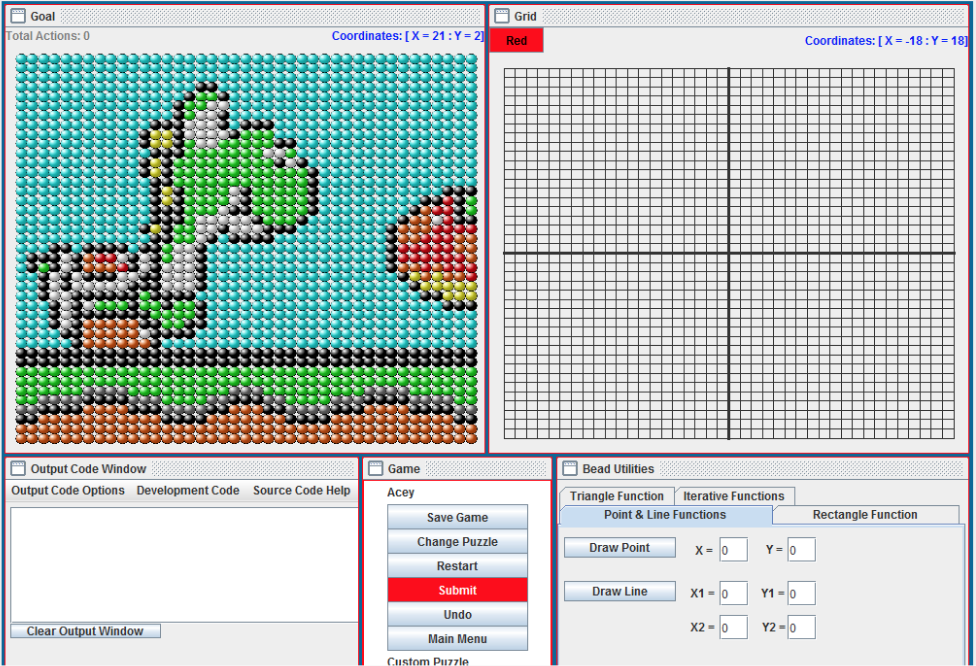 |
BeadLoom Game BeadLoom Game is an online educational puzzle game and community site designed to teach specific STEM concepts through game play, creativity, and competition. It was originally created in order to augment an existing educational tool called the Virtual Bead Loom (VBL), a work by Ron Eglash in 2006. This tool was designed to teach Cartesian coordinates, geometry, and iteration through the free-play creation of custom native American bead art. Using the tool in local outreach we found that while the tool was effective at teaching Cartesian coordinates and basic geometry, the game provided no internal motivation to explore the concept of iteration. |
|||||
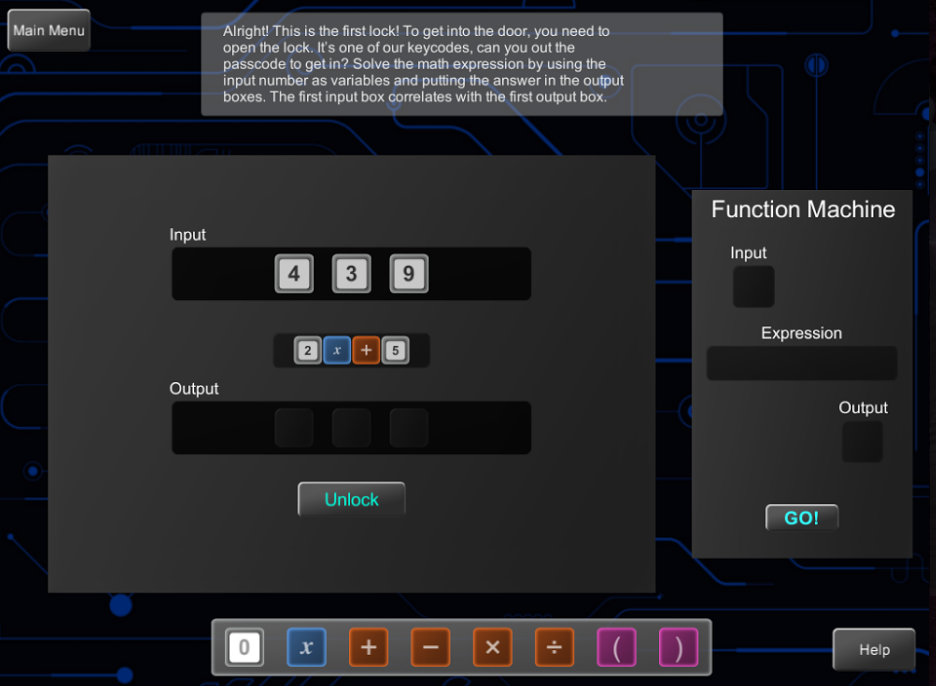 |
Code Breaker CodeBreaker is a game for 6th graders to learn how to solve pre-algebraic expressions. This object of the game is to crack the code and break open the high-tech locks by solving the pre-algebraic expressions by calculating the output with the given input and expression. CodeBreaker is underdevelopment in its early stages so does not yet have a demo but will soon be available online and on tablet. |
|||||
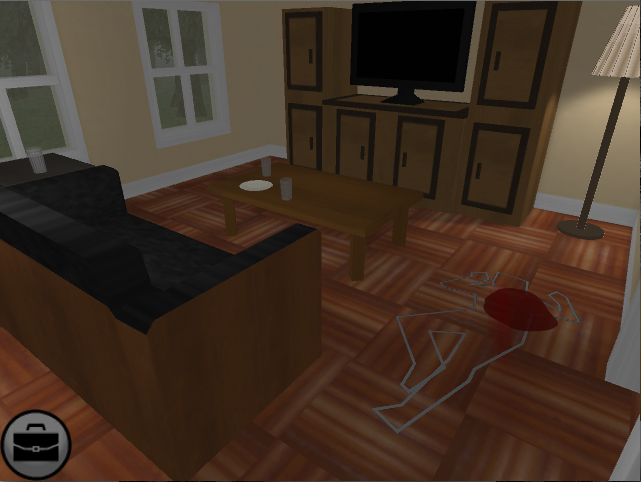 |
CSI Adventure CSI Adventure is a first person forensics game where players navigate various crime scenes, collecting evidence along the way. Once the player has collected enough evidence they can head back towards the lab where they analyze evidence using techniques from science. The goal of this game is to engage players and raise their interest in taking science and math courses. This game was originally developed for Shaw University, an HBCU under an STEM Infusion NSF grant. |
|||||
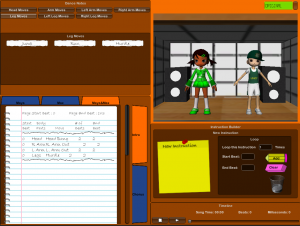 |
Dance Tool This is a culturally situated design tool (CSDT) developed to teach students simple programming concepts with a youth-culturally oriented environment. This project incorporates dance and music to appeal to middle school students and the younger generation. It was designed to teach iteration and conditional statements through using the same concepts found in dance and music theory. By leveraging the atmosphere of dance and music, middle school students are more likely to find learning the programming concepts more fun and exciting. |
|||||
 |
PILOT - Owen's Data Dash Owen's Data Dash is an educational game currently in development designed to teach fundemental concepts of data structures. In this platformer, players interact with virtual manipulatives designed to mimic basic data structures and must use operations on these structures to navigate game levels. The pilot game will be tested within undergraduate Data Structures courses starting in the fall. Further directions of the project include data-driven generation of levels and providing a platform for educational game designers to rapidly test different mechanical representations of learning objectives. |
|||||
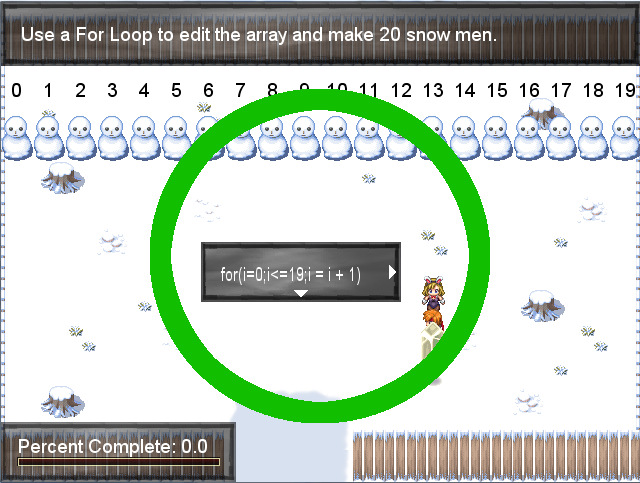 |
Wu's Castle Wu's Castle is a simple game that was developed using Game Maker, starting back in 2007 and is one of our successful educational games. In Wu's Castle players must navigate a path way, following the behavior of nested loops. By completing this path, and in the order dictated by the variables of the loop, students get to see first hand and experience the behavior of nested loops. In the next level students work with the loop itself to build an army of snowmen, changing the loop variables to build an appropriate snowmen army. Now students get a chance to apply what they have learned in the previous level. Just as level design scaffolds the player's experience, Wu's Castle scaffolds the learning experience to the student. |
|||||
Social Games |
||||||
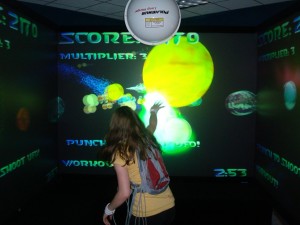 |
AstroJumper Astrojumper is a game aimed at improving interaction and development for children with Autism. Additionally Astrojumper is a successful exercise-based video game which requires players to exert themselves physically. Astrojumper was developed in collaboration with members of the UNC-Charlotte VisCenter and members of the Future Computing Laboratory. One of Astrojumper's most unique characteristics is that it was developed for a cave, 3 giant screens with projectors, and a head mounted tracking system as well as stereoscopy, i.e. 3D images. |
|||||
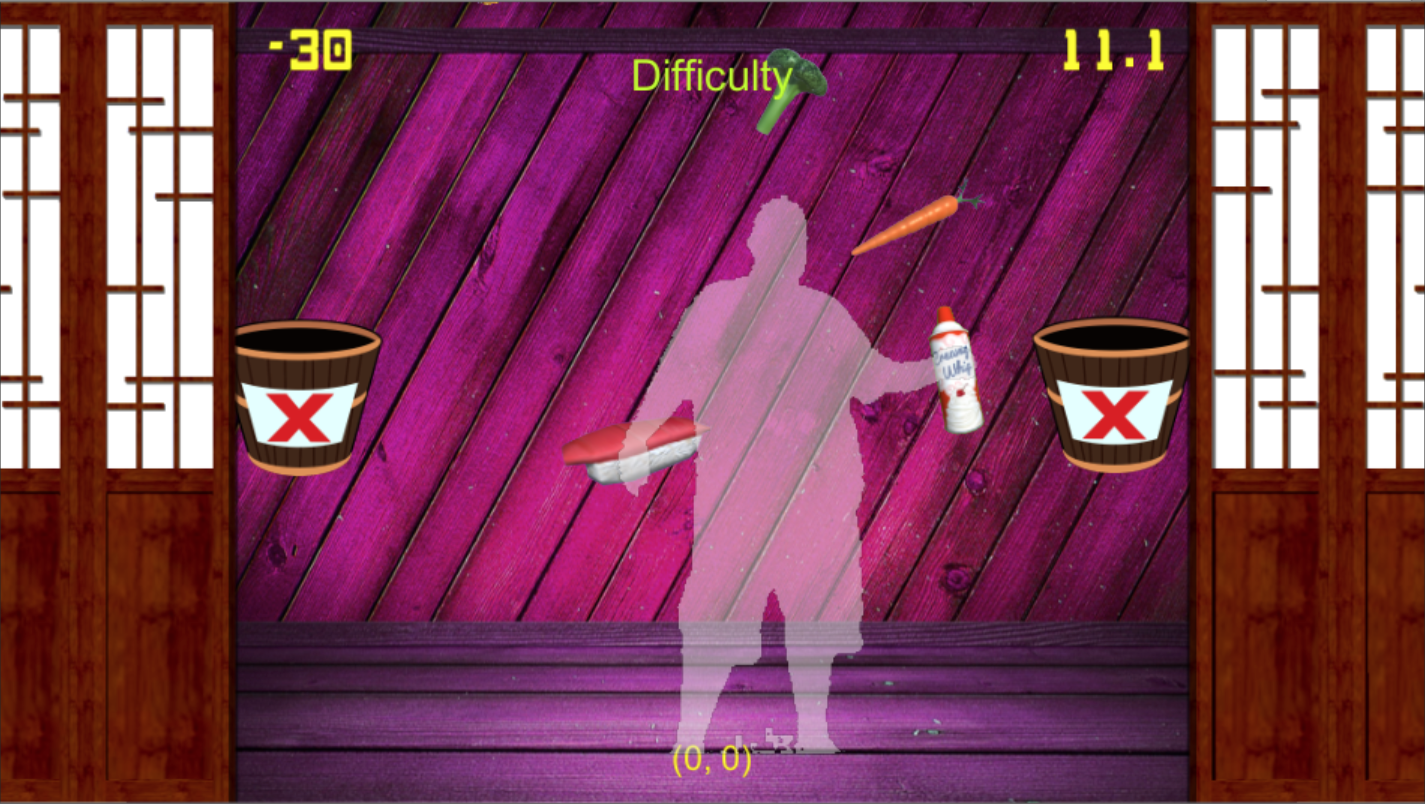 |
Nutri Ninja NutraNinja is an educational exercise game for the Xbox Kinect designed to help kids add in exercise to their day in a fun and interactive way. The player catches healthy food as it falls and avoids unhealthy food. In some levels, players are able to grab the food and put the good food in a basket and the bad food in a trashcan, to help teach kids some common healthy and unhealthy food choices. |
|||||
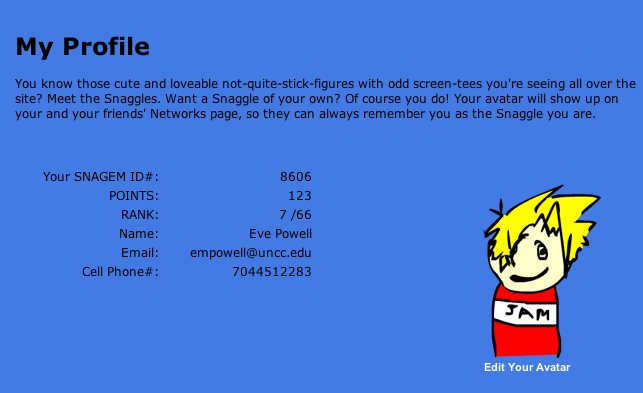 |
Snag'em Snag'em is a large group networking game that is essentially a human scavenger hunt. Snag'em is a web-based game using that allows players to create their online profile and forge connections with other users. In this social networking game, players create a list of facts about themselves, called tags, which are then randomly presented to other players as missions. Missions are presented in the format,SNAG someone who works in the Game2Learn lab, and can only be completed by interacting with a person who fit this qualification. This game is particularly effective for fostering connections between first time conference goers and undergrads. Visit: Snagemgame.com |
|||||
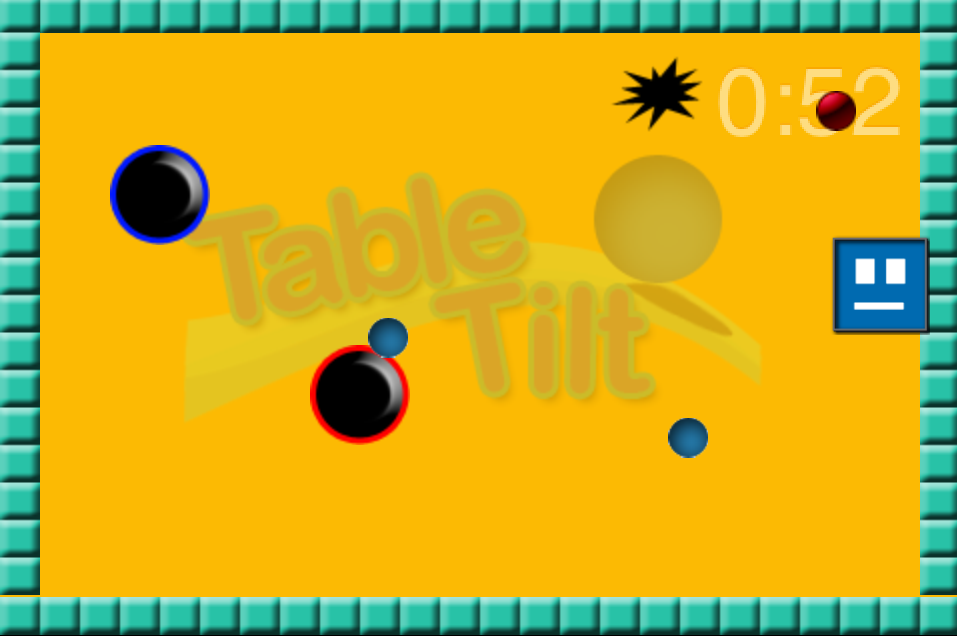 |
TableTilt A cooperative, 2 to 6, player game built for the iPhone platform. Players need to work together and communicate with one another in order to move a ball to the designated goal. This game makes use of iPhone's accelerometer to understand the orientation of the device, and the game-ball rolls around on the screen based on the angle of the phone. However traps are also placed randomly about so the game requires finesse as players try to work together and score as many goals as possible within a set period of time, while also avoiding the unwanted traps. |
|||||
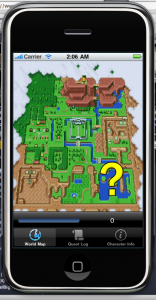  |
World of Workout World of Workout - World of Workout is an iPhone application that serves as a game-based pedometer. Like a standard pedometer, World of Workout counts the user's steps to determine the distance traveled in a given time period. However, World of Workout uses Role-Playing Game (RPG) elements to provide motivation to the players through quests, level-able characters, and in-game items. These addtions go beyond the standard pedometer hardware and work with the intrinsic motivation found in highly successful, commercial games (such as World of Warcraft) to provide a motivational fitness tracker. |
|||||
Cultural Education Games |
||||||
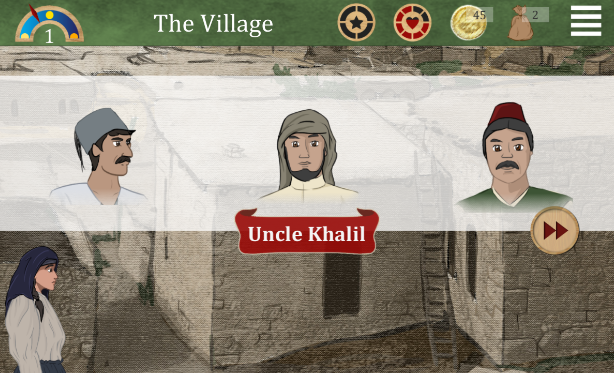 |
Emigre Emigre is a prototype game to teach the history of immigration to the United States. The game currently follows Hind, and Lebanese immigrant at the turn of the 20th century, making here way from Mount Lebanon, through Beirut, Marseilles, and eventually Ellis Island to reach the United States. Along the way, she encounters challenges and friends, reflecting the real-life stories of similar immigrants who have made the journey. The game focuses on narrative to tell Hind's story, but weaves in resource management, exploration and random events to keep the game interesting. The game is currently in a prototype phase, and follows Hind only though the end of Beirut. Try it Out |
|||||
 |
Journey Journey highlights the decision-making gameplay that will eventually comprise the game. As in Emigre, the player follows Hind's journey to the United States, but in this version the focus is on balancing the economic and social decisions that have historically faced immigrants. This game represents an artifact that a student might be able to create with the planned story editor. Try it Out |
|||||
 |
Being Being is a game developed in collaboration with the Khayrallah Program for Lebanese-American Studies, which is a rhythm game teaching traditional Lebanese dances using the Microsoft Kinect. Players dance along to the music, following the recorded performance as well as graphical cues, and are scored based on how accurately they follow the dance. |
|||||
Data Analytics Tools |
||||||
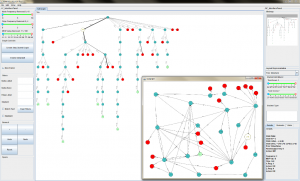 |
EDMVis EDM Vis stands for Educational Data Mining Visualization and is a portion of Dr. Barnes' NSF career award project. The purpose of EDM Vis is to help educators and researchers alike be able to explore and analyze user data that is generated from software logs. A student uses either an educational game, an Intelligent Tutoring System, or even just plays a game, and that software logs the interactions that the student is performing. Afterwards we collect all the log-data and load it into EDM Vis, so that we can explore, analyze and understand how a particular student, or even a class of students may have used the tool. That way we can get a better understanding of how a software tool was used, so that we can either improve the tool, or see where students are learning, or what aspects of the tool were the most effective at achieving the desired goal. |
|||||
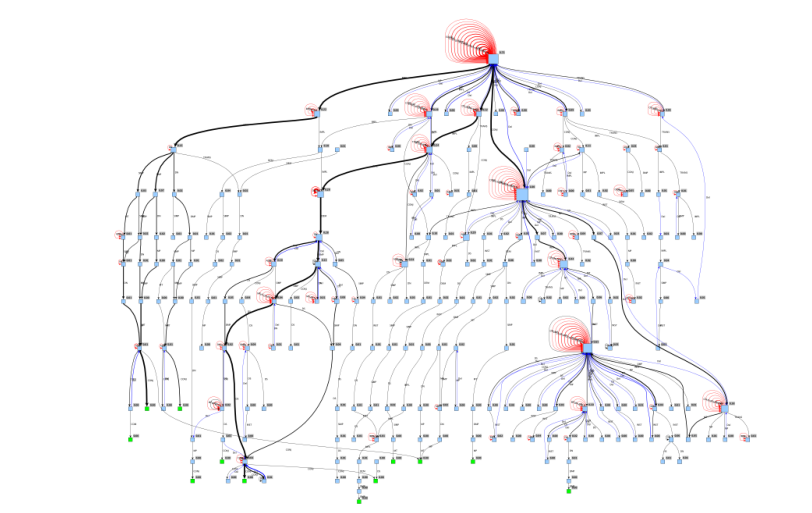 |
InVis
InVis is a tool for the analysis of student-system interaction data collected from Intelligent Tutoring Systems or other educational tools. InVis 1 provided a graphical workbench that allowed users to load existing system logs, construct interaction networks, and to identify frequently used paths and other features. InVis 2, currently under construction, will provide for the programmatic construction of interaction networks, the automatic evaluation of those networks, their export in standard formats, and the calculation of value iteration for hint extraction via the Hint Factory algorithms. |
|||||
Broadening Participation in Computing |
||||||
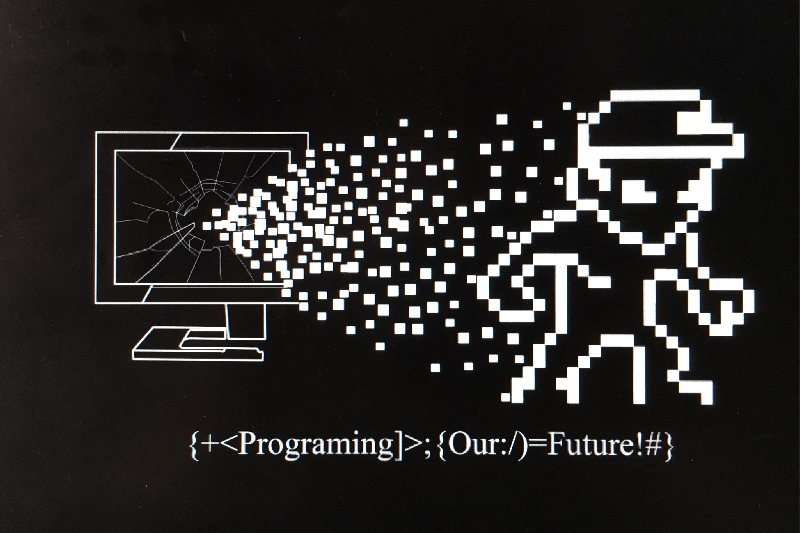 |
Bridge to Computing
This is a collaborative anti-gang initiative between the Give Back Organization, North Carolina State University's Computer Science Department, Raleigh Police Department and the City of Raleigh. The initiative is designed to capitalize off the younger generation's love of video games in order to provide at risk youth an opportunity to develop a tangible skill. It is the hope of the collaborative that the kids involved will choose Game Over Gangs. More about it |
|||||
| IIM-REU (Research Experiences for Undergraduates)
The Intelligent and Interactive Media and Games REU Site at NC State University immerses a diverse group of undergraduates in a vibrant research community working on cutting-edge interactive and intelligent media including serious games and game technologies, interfaces, visual experiences, and natural language dialogue. The IIM REU at NC State recruits broadly, but focuses on providing opportunities for students from underrepresented groups, and from colleges and universities with limited research opportunities, reaching students not typically exposed to research. More about it |
||||||
Data-driven Intelligent Tutoring Systems |
||||||
| |
iSnap
iSnap is an extension of Snap - a block-based programming environment for novices - which adds intelligent features such as detailed logging, data-driven hints derived from past students, and support for subgoals. The goal of iSnap is to support novices learning to solve creative, open-ended programming problems. Try it out |
|||||
 |
Concert
Students in colleges use multiple online tools such as the Piazza forum, Jenkins Automated Grader, the GitHub submission system, MyDigitalHand, and Moodle. Concert is a novel platform that aims to: integrate data from these online tools using data mining techniques, detect when students need help using Machine Learning methods, provide a single student interface for notifications, track student progress in real time on all these platforms. Concert will also identify students' help-seeking and collaboration behaviors and study trends on how students navigate online tools. Concert will bridge the knowledge gap and increase understanding of students' help-seeking and study behaviors as well as social interactions that affect learning outcomes. Supported by NSF Developing Integrated Teaching Platforms to Enhance Blended Learning in STEMAward Amount:$597,529 Start Date:10/01/2018 Award Number:1821475 |
|||||
 |
Counting Tutor
This project will augment three existing e-learning interactive environments; more specifically, it will add data-driven techniques for the automatic generation of next-step hints and for the automatic selection of learning activities. Supported by NSF Generalizing Data-Driven Technologies to Improve Individualized STEM Instruction by Intelligent TutorsAward Amount:$1,999,578 Start Date:08/15/2020 Award Number:2013502 |
Contact Information:
|
||||
Computer Science Education |
||||||
 |
CS Frontiers
Building on the foundations set by the AP Computer Science (CS) Principles course, this project seeks to dramatically expand access, especially for high school girls, to the most exciting and emerging frontiers of computing, such as distributed computation, the internet of things (IoT), cybersecurity, and machine learning, as well as other 21st century skills required to productively leverage computational methods and tools in virtually every profession. Creating pathways that stimulate high school learners' interest in advanced topics with the goal of building a diverse, gender-balanced, future-ready workforce is a crucial and impactful imperative addressed in this work. Supported by NSF Collaborative Research: Beyond CS Principles: Engaging Female High School Students in New Frontiers of ComputingAward Amount:$555,000 Start Date:05/01/2020 Award Number:1949492 Learn More |
Contact Information:
|
||||
 |
PlanIt
We are investigating student plans and implementation of their plans in Snap programs to figure out patterns in the plans and also to understand how they usually craft plans. We plan to use the results of this investigation to implement a tool that will automatically (using the help of machine learning algorithms) map plans to programs. The project will help us to provide better automated feedback to students when they are involved in open-ended programming. Supported by NSF Intelligent Support for Creative, Open-ended Programming ProjectsAward Amount:$749,920 Start Date:08/01/2019 Award Number:1917885 |
Contact Information:
|
||||
 |
Positive Feedback System
Open-ended, media-rich visual programming environments such as Scratch and Snap represent the next-generation genre for engaging and inspiring students to learn programming. However, it is a particularly challenging area for data-driven support due to the extremely large potential solution spaces and the very creative embellishments that make them attractive. This project integrates intelligent student support that is derived from data into the media-rich, open-ended problem solving in the Snap programming environment. Supported by NSF EXP: Data-Driven Support for Novice ProgrammersAward Amount:$549,874 Start Date:09/01/2016 Award Number:1623470 |
Contact Information:
|
||||
 |
EcoCS
Together with Reedy Creek Magnet Middle School and the Friday Institute we are partnering to develop a culture of computational thinking (CT) within Reedy Creek's digital sciences magnet program. Starting in 2016, our research team has provided repeated and varied PD around Snap coding and CT. This relationship has developed into a Research Practice Partnership where teacher leaders from the school and other administrators work together to lead CT integration. We are also trying to replicate our model for integrating CT at new schools in the Charlotte Mecklenburg school district together encompassing the largest two school districts in NC. Supported by NSF Collaborative Research: Developing a Systemic, Scalable Model to Broaden Participation in Middle School Computer ScienceAward Amount:$497,176 Start Date:12/01/2018 Award Number:1837439 Learn More |
Contact Information:
|
||||
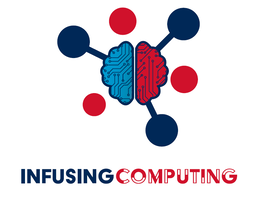 |
Infusing Computing
Starting in 2017, the Game2Learn lab has partnered with faculty from the Citadel to improve computing learning across North Carolina and South Carolina by delivering computing-infused, STEM-focused professional development to middle and high school teachers. Each summer 120-160 teachers attended the Infusing Computing PD with support from returning teachers as facilitators and high school intern code helpers. The research team continues support throughout the academic year through webinars, class assistance, and code help. Supported by NSF Collaborative Research: Integrating computing in STEM: Designing, developing, and investigating a team-based professional development model for middle- and high-school teachersAward Amount:$861,773 Start Date:09/01/2017 Award Number:1742351 Learn More Explore our Integrated CT Activity Library Apply for This Summer's Program! |
Contact Information:
|
||||
Educational Data Mining |
||||||
| ST-Math
Created by MIND Research Institute, Spacial Temporal (ST) Math is game-based instructional software for grades K-12 and is designed to boost math comprehension and proficiency through visual learning. Current research, in collaboration with Dr. Rutherford and Dr. Lynch, focuses on applying data-driven methods to understand gameplay and learning, and to identify opportunities for platform improvement and actionable recommendations. Supported by NSF Evaluation for Actionable Change: A Data-Driven ApproachAward Amount:$799,837 Start Date:01/01/2016 Award Number:1544273 Learn More |
||||||
| |
ModSoc
The ModSoc project is a collaborative research project focused on the identification of useful behavioral patterns in online educational tools. The project is joint work between ourselves, and researchers at the Teacher's College at Columbia University, The Educational Testing Service, and Arizona State University. As part of this work we are collecting repositories of data from blended courses offered at NCSU and UC. Berkeley as well as MOOCs offered through the Teacher's College. We have already completed the analysis of meaningful student communities in this data and shown that students form at-will communities that can reflect their own subsequent performance. We are also examining the role of peer tutoring in this data as well as the paths students take through online materials. |
Contact Information:
|
||||
| |
IUSE
The IUSE project is focused on the extraction of pedagogical and conceptual hints from existing tutoring technologies. This is joint work by Dr. Min Chi, and Dr. Tiffany Barnes. Dr. Chi's work has previously been focused on the extraction of pedagogical guidance from student data and she is continuing that work here to extract pedagogical guidance from the existing logic tutoring data. Dr. Barnes' work is focused on the extraction of conceptual information from new domains such as probability. More about it |
Contact Information:
|
||||
Diversity, Inclusion, and Equity |
||||||
 |
Antie: The Anti-Racism Education Chatbot
The widespread awareness of racially motivated police brutality has revealed the realities of systemic racism in the United States' institutional policies and has highlighted a large attraction to online platforms offering anti-racism educational resources. Thus demonstrating a need for applications specializing in education around BLM and its platform of anti-racism, police brutality, and equity. The purpose of this project was to develop an accessible tool that specialized in delivering BLM resources to an audience who are unsure on where to begin educating themselves. Our Computing for Social Good team developed Antie: an anti-racism education chatbot that features voting information, Black-owned businesses, Black Lives Matter Movement information, terminology education, and an article search. We have developed and tested this bot with IBM's support on the IBM Watson Assistant Platform. A goal was to ultimately release it to the public to be shared via different platforms such as a website or texting/messaging apps, but currently Antie is not active. |
Contact Information:
|
||||
 |
Project CATCH
Project CATCH (Community Action Target Children who are Homeless) is a program of The Salvation Army, founded in 2011, that provides youth focused services to children ages 0 ? 18 years old experiencing homelessness. Through collaboration, families are connected to resources and supports that assist them in maximizing their child's physical, cognitive, and social/emotional development. As part of our recent partnership, we teach participants computer science concepts while demonstrating emotional processing, coping, and communication skills to help them express themselves clearly. Through socially relevant scenarios, created in Twinery, we help participants generate their own stories while incorporating the skills we want them to develop and demonstrate. |
Contact Information:
|
||||
 |
AI4SG: AI for Social Good
Our AI4SG team is interested in AI and machine learning research specifically with socially relevant applications. We have been exploring a wide variety of avenues by conducting a literature review, and currently are in the design process for our own ML/AI research study under the AI for Social Good topic. We are open to new students, and if you would like to learn more contact Lauren Alvarez and Zari Mcfadden. |
Contact Information:
|
||||

Game2Learn Lab
Research
.
Department of Computer Science
890 Oval Drive, Campus Box 8206- Raleigh, NC 27695-8206
890 Oval Drive, Campus Box 8206- Raleigh, NC 27695-8206